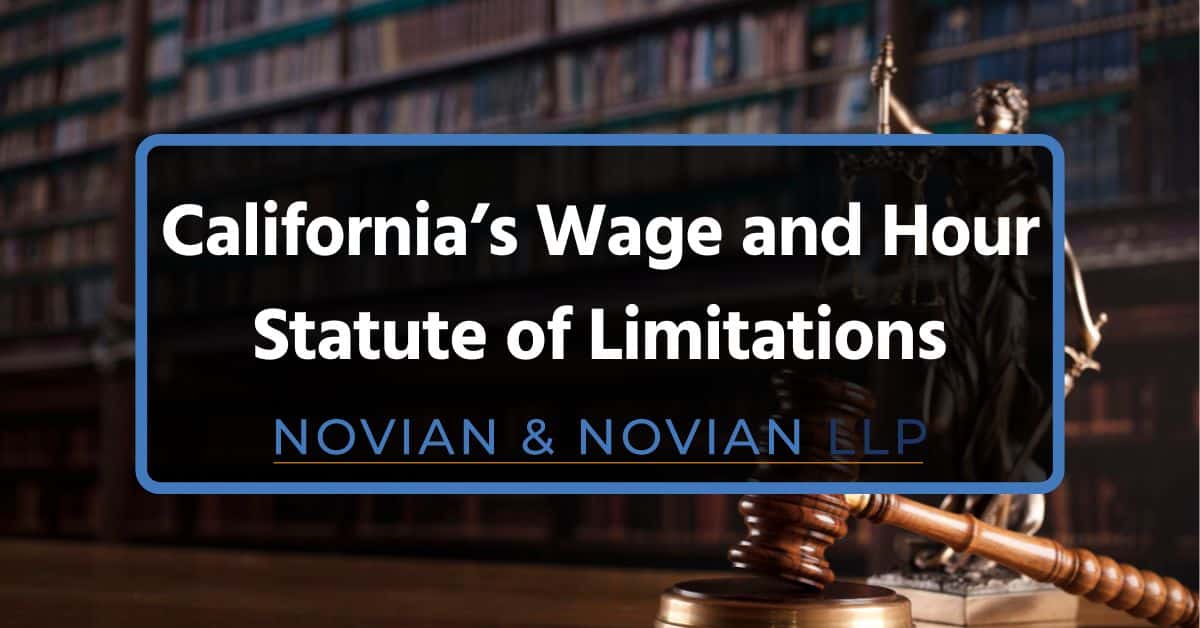
by | Apr 12, 2024 | Employment Law
California has some of the most employee-friendly wage and hour regulations in the country. California employees can sue employers for unfair business practices, an unpaid wages claim, unpaid final wages, according to California employment law.
While the statute of limitations for wage and hour claims in California varies depending on the nature of the claim, the timeline to file a claim ranges from one to four years. Knowing this information is important to stay compliant with the law and avoid wage and hour disputes.
For more than 30 years, Novian & Novian has been assisting employers with employment claims, and wage and hour issues. We are the go-to employer defense attorneys you need to guide you through complex legal solutions that protect your business interests and help you through the process of wage and hour claims. Book a free consultation with us now to learn how we can help you stay compliant as a business owner or assist you with a wage and hour claim.
This blog will be your guide to understanding your rights and obligations as an employer under California law.
Wage and Hour Laws in California
California wage and hour laws are regulations that have been put in place to ensure that employees are treated fairly within the workplace. Some of these laws center around overtime, minimum wage, rest breaks, etc.
Common violations by employers include unpaid wages, minimum wage violations, failure to meet overtime requirements, and rest break violations. An employee can file a wage and hour claim if any of these happen.
As an employer, you need to understand that wage and hour claims in California are necessary so you can manage compliance within the workplace. If you need help understanding the complexities of wage and hour disputes, contact us today!
What is the Statute of Limitations?
The statute of limitations is a legal principle that sets the maximum time after an event within which legal proceedings may be initiated. It is through this principle that we have deadlines for filing claims related to unpaid wages, wrongful termination statute of limitations, overtime, rest breaks, and other labor code violations.
It ensures legal disputes are resolved within a reasonable timeframe. This promotes fairness by preventing the indefinite hanging of potential legal action over the parties involved. In addition, this legal principle maintains the integrity of evidence and the reliability of witness testimonies.
It is important for all employers to understand these deadlines so that they manage legal risks properly.
Wage and Hour Statute of Limitations, California
In California, the statute of limitations for wage and hour claims varies depending on the type of claim. For example, most wage and hour violations like unpaid wages, overtime, minimum wage, and rest break violations carry a three-year statute of limitations.
However, certain claims like an oral promise may have a different statute of limitations. An oral contract usually has a two-year limit, while a written contract allows up to four years for claims. Furthermore, other unpaid wage claims like unpaid overtime, minimum wage violations, and missed rest breaks have a three-year statute of limitations.
Key Timeframes to Know for Statute of Limitations Claims
The wage and hour statute has certain times that you need to be mindful of as an employer. For example, overtime and minimum wage claims usually have a three-year statute of limitations. Within this time limit, workers can file claims for not receiving the state-mandated minimum wage. Rest breaks and meal violations also fall under the three-year statute of limitations. For such claims, California employees can seek compensation for missed meals and rest breaks.
In addition, employees have a three-year window to claim unpaid wages. For final wages not received upon termination, the timeframe to file a claim can vary, but action should be taken promptly to ensure rights are protected.
Understandably, keeping up with these deadlines and timeframes can be challenging as an employer engaged in various activities. That is why you need to seek legal advice and work with employment attorneys to ensure you are always in check. Contact Novian & Novian now to work with one of the best employment attorneys in California.
Statute of Limitations: Exceptions and Extensions
It is best to keep in mind that there may be some exceptions to the statute of limitations. Exceptions like tolling and delayed discovery can extend the deadlines for filing claims.
Tolling might occur when the plaintiff is a minor, mentally incapacitated, or the defendant’s actions conceal the harm. Delayed discovery applies when a claimant couldn’t have reasonably discovered the harm until later. Thus, the situation allows for extension.
These exceptions and extensions are critical for ensuring justice. They show that there is room for flexibility in the legal process under special circumstances.
Statute of Limitations Claims
As an employee, the first step to initiating a California wage and hour claim is gathering evidence of the issue. It is what would give your case substance in court. The evidence could be pay stubs or work schedules. Once you have gathered evidence, you can file a claim with the California Labor Commissioner’s office. The wage and hour claim should detail the exact violations like unpaid wage claims or break infractions.
For employers, there is also a high need for documentation in initiating a wage and hour claim in California. You must maintain thorough records of all employee hours, wages paid, and any agreements or policies related to employment.
If a claim is filed against you, consulting with employment attorneys can provide guidance and ensure your rights are protected throughout the legal process. An employment lawyer would also help you prepare a defense based on accurate records and compliance with California wage and hour laws.
Consequences of Non-Compliance and Missing Deadlines
Not filing a wage and hour claim within the statute of limitations in California typically means forfeiting the right to pursue the claim. It potentially means you’ll be leaving unpaid wages unclaimed.
Ignoring or not responding to a claim filed against you can result in a default judgment, compelling compliance, or payment without your input. That is why you must always respond within the allocated time frame.
Legal remedies might include negotiation, arbitration, or, if timely, litigation. It’s crucial to seek legal advice to explore alternatives such as tolling or exceptions that might extend deadlines. This ensures rights and obligations are adequately addressed.
How Can You Benefit From Consulting With An Employment Lawyer?
Understanding the statute of limitations is crucial for both employers and employees to ensure timely action on wage and hour claims. It helps to consult with an employment lawyer who can help navigate these complexities, identify potential claims or defenses, and ensure compliance with California law.
Employers who find themselves not compliant should act quickly to rectify issues to minimize legal repercussions. Novian & Novian, considered one of the best Los Angeles Employer defense practices, is more than capable of helping you with business litigation and dispute resolution. Reach out to us now!
Contact Us
Have questions about this post? Novian & Novian is a full service law firm in Los Angeles with clients that span the country. Contact us today for a free consultation.
Contact Us
Have questions about this post? Novian & Novian is a full service law firm in Los Angeles with clients that span the country. Contact us today for a free consultation.





